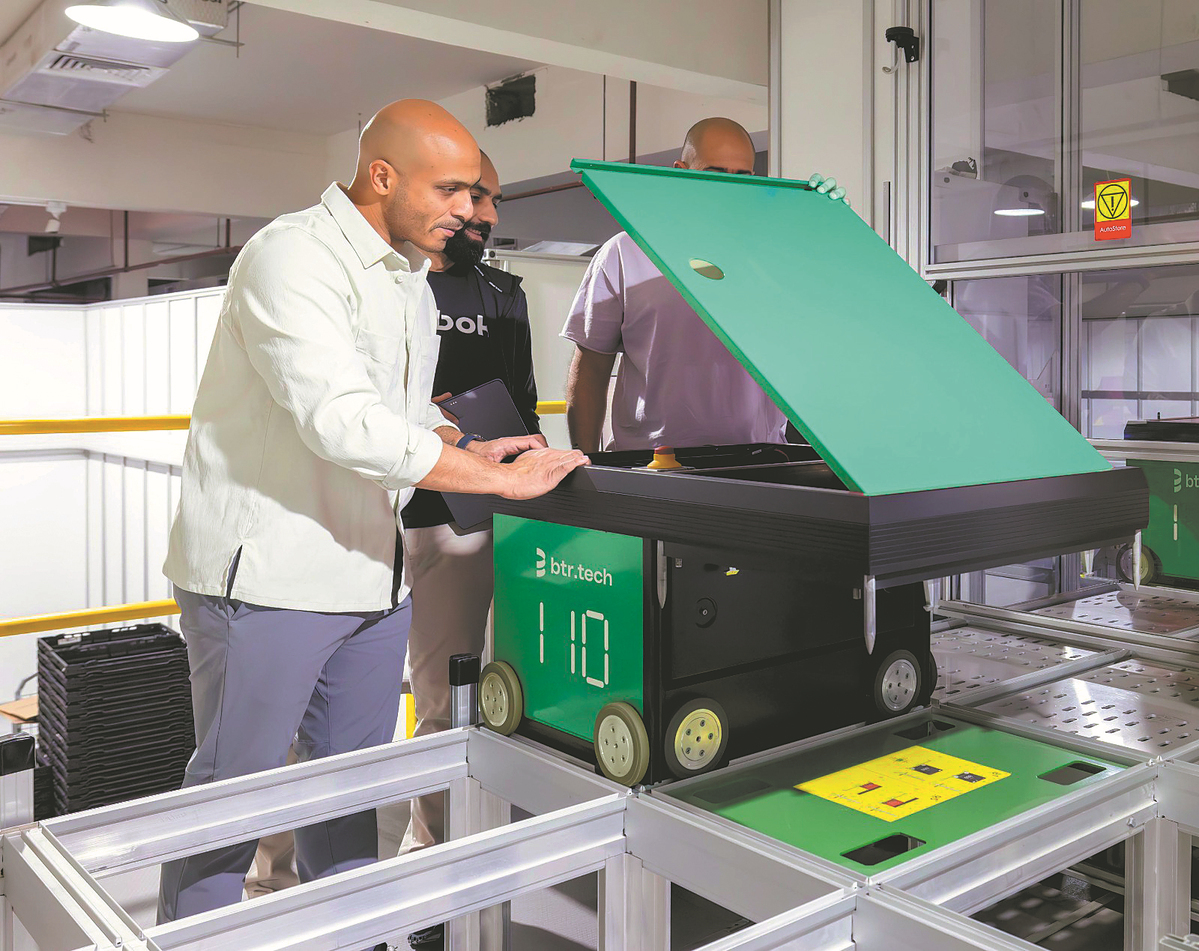
Editor’s note: China Daily presents the series Friends Afar to tell the stories of people-to-people exchanges between China and other countries. Through the vivid narration of the people in the stories, readers can get a better understanding of a country that is boosting openness.
China has spent many years developing its automation and robotics industries, and it is now the appropriate time to bring that expertise to the member countries of the Gulf Cooperation Council, or GCC, said Saleh Al Tunaib, co-founder and CEO of btr.tech.
The GCC comprises Saudi Arabia, Kuwait, the United Arab Emirates, Qatar, Bahrain, and Oman.
“We’ve been working with Chinese companies for a while and we found there are huge opportunities,” Al Tunaib said, noting there was “ease of working and efficiencies” in the way the Chinese companies do business.
“Usually, when we try to bring technologies from Europe to the Middle East, it takes between nine and 12 months to bring them here,” Al Tunaib said. In contrast, Chinese companies take three months to come in and deploy their technologies, he added.
Al Tunaib noted he has been working in the retail industry for almost 15 years, and said he sees a huge need for automation in the sector. For instance, the value of e-commerce can be expected to reach $40 billion in the next couple of years, in his view.
When his team built their first automated warehouse, they went through a process of trying to choose the right technology. “We dealt with mainly US and European technologies, as the access to Chinese technology was very difficult… in 2020,” he said.
It was only when his team gained more exposure to the Chinese market that they realized the existence of many Chinese technologies that they could bring to the Middle East region.
In the Middle East, there was not enough access to Chinese technology, he said. Al Tunaib’s team seeks to bridge the gap between China and the Middle East as there is a “huge opportunity” for bringing Chinese e-commerce technology to the region.
Al Tunaib’s team, which runs a logistics hub out of Kuwait, operates its own software to integrate the use of robotics in the retail industry.
After operating AutoStore, an innovative automated material handling solution, for a few years, his business gained a better understanding of the Chinese market, he said. Then, with the help of eWTP Arabia Capital, which provides access to technology from mature global markets, Al Tunaib’s team visited China in January.
They visited four cities in China, including Guangzhou, Shenzhen, Shanghai, and Hangzhou, where they interacted with multiple robotics companies.
According to Al Tunaib, his company is setting up clients with auto parts and e-commerce warehouses in Kuwait across 35,000 square meters with the help of robotics technology from China. One of the companies involved in the project is Quicktron Robotics, a Shanghai-based firm in robotic logistics solutions. His team has been working with other Chinese manufacturers such as Megvii and Senad since its visit in January, he said.
There’s no need for any data to prove the need to connect Asia with the GCC and Europe. The integration of cross-border operations will bring in more business and connect us even further, he added.
Such an integration of cross-border operations will “take us to another level. It will change the way we do business”, Al Tunaib said.
According to Al Tunaib, there is great growth momentum in Saudi Arabia as the nation plans to spend $27 billion over the next four years to help improve logistics and the ports sector.
The investment is part of Saudi Arabia’s Vision 2030 and aims to connect Asia through Saudi Arabia to Europe by becoming a global logistics hub.
Expertise in automation
By leveraging the Chinese company’s expertise in automation, Al Tunaib’s company aims to transform the logistics operations of e-commerce businesses throughout the GCC region.
“Today we represent Quicktron, Shenzhen DBL Technology, and many other Chinese companies in the Middle East region,” he added.
Al Tunaib said an obvious advantage of Chinese companies is their focus on a niche area in the logistics sector.
“Although there are different segments of robotics, including drones or electronic vehicles, within each segment of robotics every Chinese company has its own focus, such as the Automated Case-handling Mobile Robot. The Chinese companies want to be the best in a specific technology.
“In many other countries, what we’ve seen is that they try to do something of everything,” he noted. In this process, “sometimes you lose focus”, Al Tunaib added.
Al Tunaib collaborates with Chinese companies in two ways. One is by bringing technology to the region and adopting these for the public and private sectors. The other way is bringing relevant technologies and manufacturing partially or entirely in the GCC.
“So, there are ways for us to innovate together, bring our minds and resources together,” he said.
According to Al Tunaib, the people of Gulf countries and China share similar traits. “I love China and its people,” he said.


